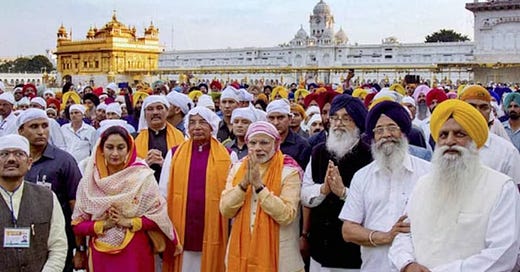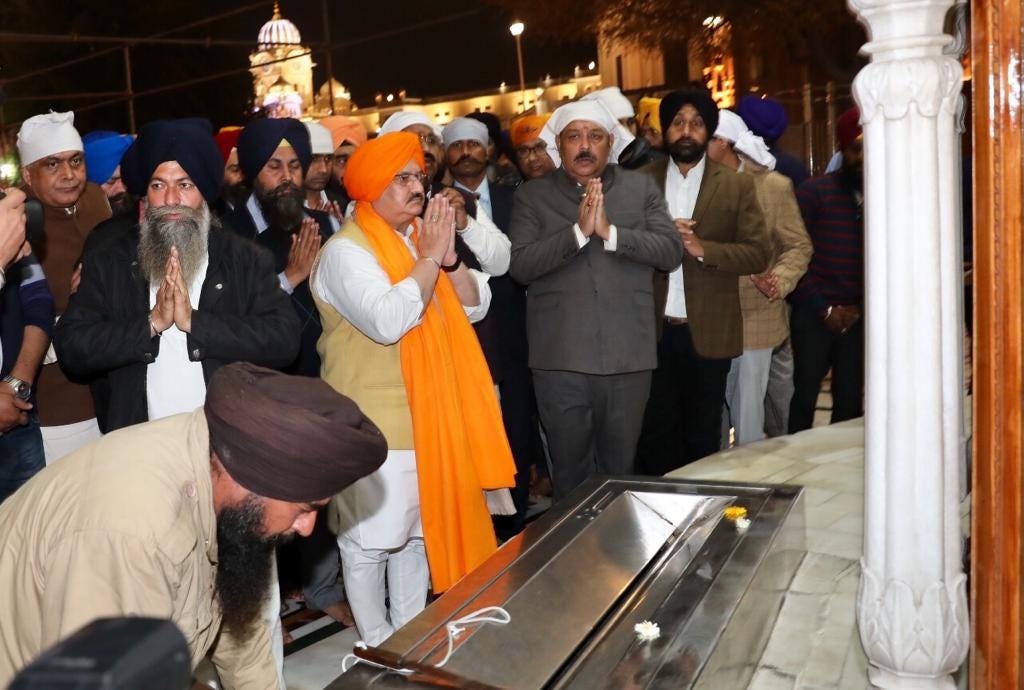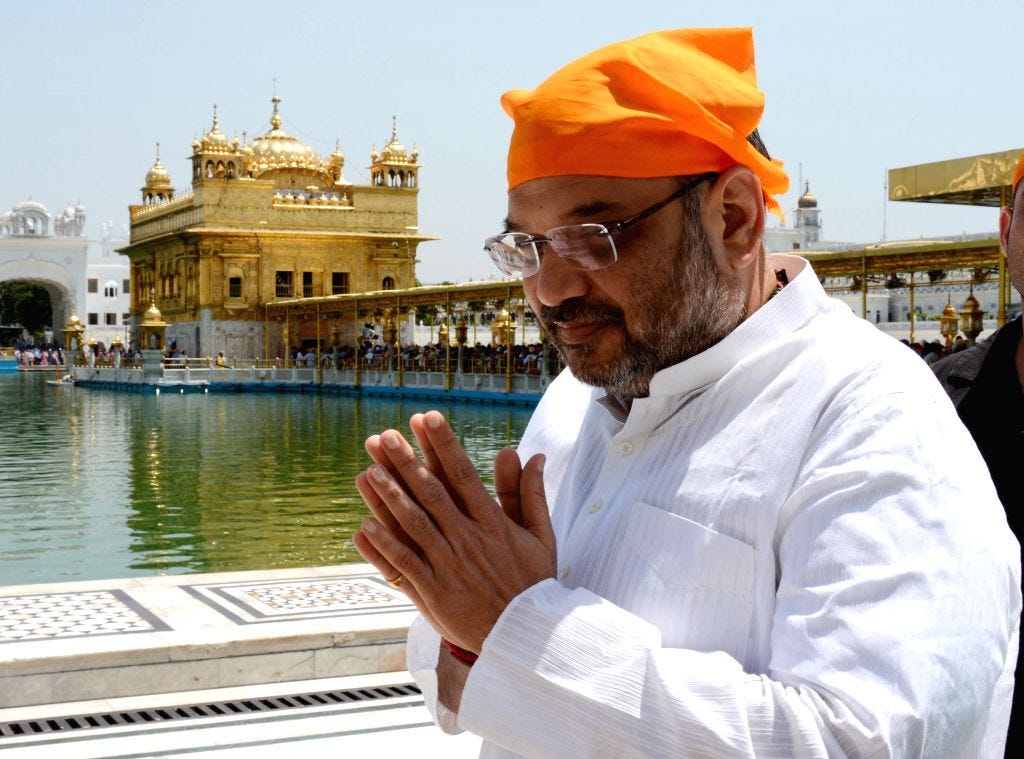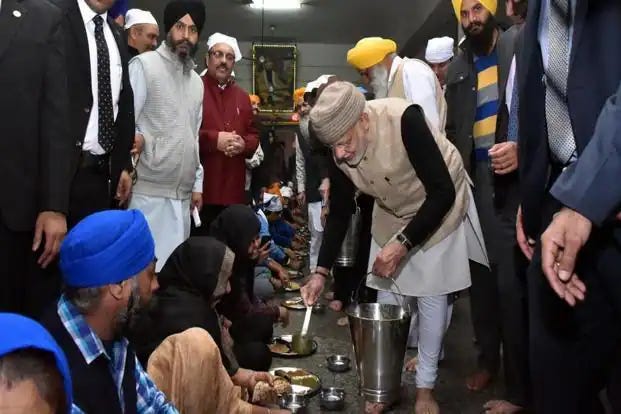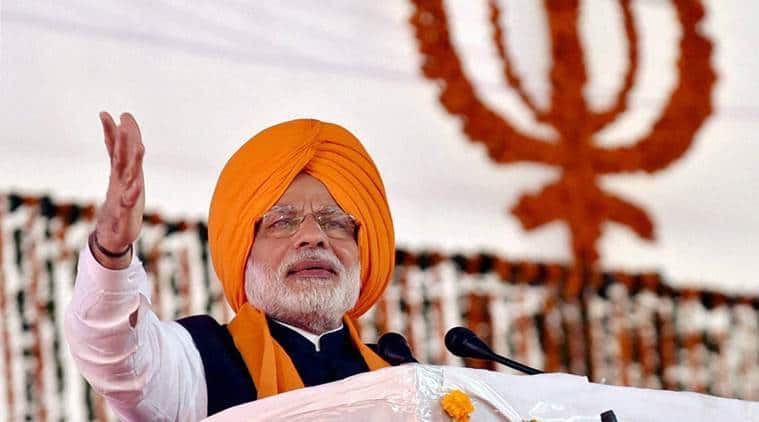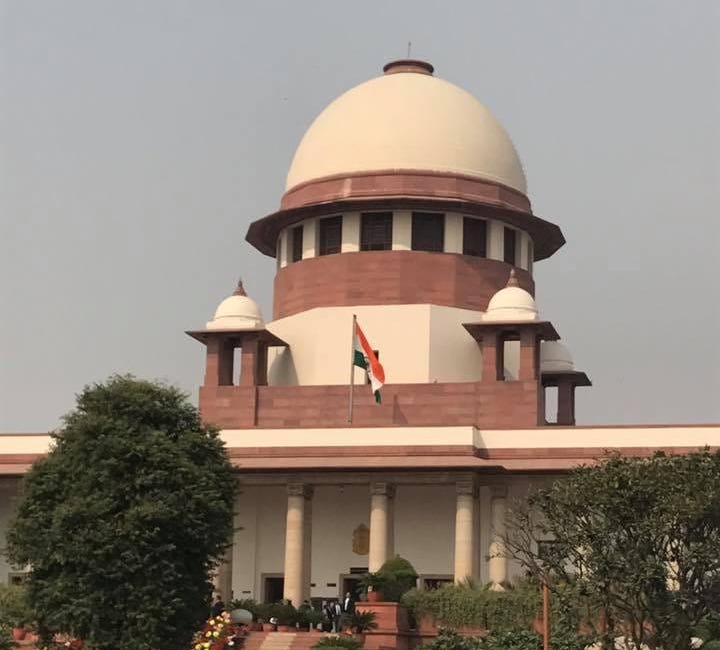BJP in Punjab: A Prescription for Long-Term Strategy Beyond Elections
With Madhya Pradesh, Rajasthan and Chhattisgarh done and dusted, the Saffron Party may focus on Punjab, not as a run-up to the Lok Sabha elections but as a long-term strategy.
Introduction
In the wake of the Bharatiya Janata Party's (BJP) scintillating victories in the Vidhan Sabha elections across Madhya Pradesh, Rajasthan, and Chhattisgarh, India's political landscape is at a pivotal juncture, an obvious point of inflexion. As the BJP prepares for the crucial 2024 Lok Sabha polls, the upcoming weeks provide a strategic opportunity to tailor and enhance its long-term approach for Punjab—a state of significant geopolitical importance, with its unique socio-political texture and a demographic profile distinguished by a significant Sikh population.
Recognizing that the strategies which have borne fruit in the Hindi heartland may not be directly transferrable to Punjab’s distinct milieu, the BJP, with its extensive national presence, may have discovered it Eureka moment to develop a forward-thinking political ethos. Such an ethos must resonate deeply with the Sikh community's concerns and aspirations while aligning with the broader ambitions of Punjab's diverse populace, thereby reinforcing the BJP’s vision for a united and prosperous India.
Inclusivity as the Archstone
At the heart of BJP's approach in Punjab should be an inclusive, long-term vision, one that resonates with all sections of Punjabi society - be it the Sikhs, the Scheduled Castes, or the Hindu community. A central element of this strategy is fostering a positive, constructive engagement with the Sikh community, whose historical, cultural, and spiritual influence permeates throughout the state. It is crucial for the party to demonstrate a deep respect for the Sikh heritage and traditions while also advocating for modern, progressive values that align with the evolving aspirations of the younger generation.
Inclusivity must also extend to the Scheduled Castes, who constitute a significant proportion of Punjab's population. BJP's engagement with the SC community must go beyond mere political symbolism. The party needs to articulate and implement tangible measures that address their concerns and contribute to their social and economic upliftment.
Furthermore, BJP should strive to build a constructive relationship with the Hindu community of Punjab. Despite being a majority at the national level, the Hindu community in Punjab has its unique socio-cultural identity and concerns, often different from their counterparts in other states. The party must engage with this community in ways that acknowledge these distinct concerns and ensure that their voice is represented in the policy discourse.
Taken together, these strategic pillars form the foundation of a comprehensive, inclusive, and long-term approach for the BJP in Punjab.
Long-term perspective required
The BJP should indeed adopt a long-term perspective when it comes to Punjab, moving beyond immediate electoral gains and focusing on a strategic plan that spans across a decade. Short-term political victories can offer fleeting gains, but long-term planning is the key to substantial, sustainable growth and development. This would include setting and implementing policy frameworks that promote inclusive growth, cultural respect, and regional development, ensuring that the state's concerns are consistently addressed.
Looking ahead to the future, the BJP must not just limit its vision to the forthcoming Lok Sabha elections in 2024 or the Vidhan Sabha elections in 2027. It should have a broad plan of action that encompasses measures aimed at social, economic, and political empowerment of all sections of society in Punjab. By taking a decade-long perspective, the BJP can ensure that it creates lasting, impactful changes in Punjab, helping the party establish a stronger and more connected relationship with the people of the state.
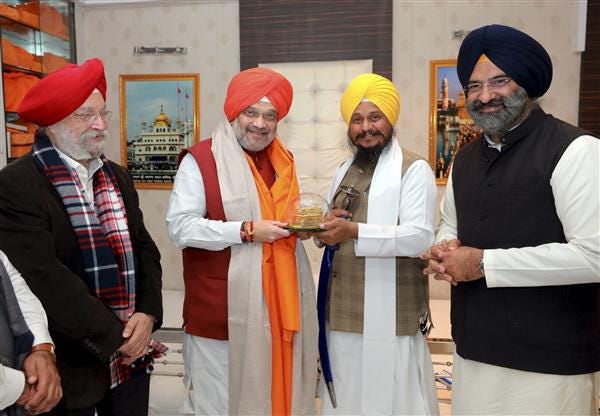
Shiromani Akali Dal and SGPC
The alliance between the BJP and Shiromani Akali Dal (SAD) indeed had a significant impact on BJP's growth in Punjab. Despite having helped the coalition come to power thrice, BJP remained a junior partner, with its influence restricted to a limited number of assembly constituencies. The coalition's foundation was based on Hindu-Sikh unity, a principle which fortified it.
However, the SAD's perception as a family-run entity, often likened to a private limited company controlled by the Badals, led to dissatisfaction and an erosion of its influence, particularly among its core demographic of rural Sikh voters, and especially Jat Sikh farmers. The Badals' control over the SGPC granted them access to Gurdwara infrastructure, manpower, funding, and even moral authority.
The tenure of the SGPC house has long expired with the last elections to the General House having been held over a decade ago. This necessitates prompt organization and conduct of these elections. The Sikh voters should be able to express their choices and aspirations through these elections and elect their representatives for managing the historical Sikh Gurdwaras. To prevent party politics from influencing the SGPC, it is suggested that the elections are conducted on a non-party basis, where the election symbols are not allotted.
Should the Badal faction lose control of the SGPC, it would face dual repercussions: it would no longer be able to position itself as the sole representative of Sikh interests in Punjab and beyond, and it would lose access to the resources of the SGPC, which they are often accused of misusing, although conclusive evidence has never been presented1.
Immediate SGPC Elections
The SGPC election outcomes would also indicate which party or faction of SAD truly represents Sikh interests in the state. This would provide BJP with a clear barometer if it considers aligning with SAD. As such, BJP should encourage and facilitate timely and fair elections for the SGPC, allowing Sikhs to choose their genuine representatives.
Importantly, under the Sikh Gurdwaras Act, 1925, the prerogative of conducting these elections lies with the Central Government. This places the BJP, as the ruling party at the Centre, in a critical role to ensure these elections occur. The Chief Commissioner of Gurdwara Elections has already been appointed, which suggests that the BJP can facilitate a smooth, fair, and timely election process.
This process would allow the Sikh community to elect their preferred representatives to manage their historical Gurdwaras. By promoting a transparent electoral process, the BJP could ensure democratic representation of Sikh interests, potentially altering the current political dynamics in Punjab, and aiding its consolidation in the state. This long-term approach could significantly bolster BJP's position and influence in Punjab, helping to cultivate a more diverse support base and increase its political viability in the state.
Look beyond the Jat Sikh Voter: Include the SC community
While the pursuit of Jat Sikh voters is necessary, it is vital that the BJP doesn't overlook the significant Scheduled Caste (SC) population in Punjab, half of which comprises the Sikhs. Notably, the Mazhbi Sikhs, who form part of the SC community, have a rich history of service in the Sikh Light Infantry, one of the bravest and most decorated regiments of the Indian Army. However, this community often feels marginalized and, in some cases, alienated.
Historically, the Mazhbi Sikhs did not own land, which consequently excluded them from the direct benefits of the Green Revolution and the capital appreciation that came with it. With the decrease in government and PSU jobs, they have also not received significant benefits from the reservation policy. Additionally, the dwindling opportunities in the army and the diminishing allure of a military career have added to their challenges. The benefits of other schemes, including job-related ones, seem to have been cornered by the already advantaged among the SCs, leaving the Mazhbi Sikh community further marginalized.
Socio-economic and Religious issues of the Scheduled Castes
Addressing these issues and working towards the upliftment of the Mazhbi Sikhs should be a key part of the BJP's long-term strategy in Punjab. The party must work on policy interventions that ensure a fair distribution of opportunities and resources among all sections of the SC community, and facilitate the socio-economic advancement of the marginalized groups. The party's commitment to the welfare of the marginalized sections of society, including women, should reflect in its efforts to improve the status of the Mazhbi Sikhs in Punjab. By doing so, the BJP could ensure the integration and support of this significant demographic in the state.
The social issues confronting the Scheduled Caste Sikhs extend into socio-religious domains as well. While untouchability isn't a major problem in Punjab, SC Sikhs, despite being an integral part of the Sikh community, often feel sidelined from the mainstream. Instances such as the existence of separate Gurudwaras for Jat Sikhs and SCs, despite Sikhism's egalitarian principles, emphasize this unfortunate divide. Moreover, the rising reverence of Bhagat Ravidass Ji as a Guru by many in the SC Sikh community underscores significant socio-religious shifts that cannot be disregarded.
A two-fold challenge has arisen in this context. On one hand, other political parties are attracting these voters with promises of freebies, which may or may not materialize. More critically, Christian pastors, sometimes appearing as Sikhs, are actively converting SC Sikhs, offering financial benefits and free "convent school" admissions for their children. This phenomenon poses serious socio-economic implications, largely unnoticed by significant entities in Punjab, including the SGPC.
While the Central Government is taking steps to curb foreign funding through the Foreign Contribution (Regulation) Act (FCRA), it's essential for the BJP as a political entity to acknowledge and address this issue, especially given Punjab's sensitive border state status. The party needs to devise a clear policy to counter this trend and ensure its implementation through its members, regardless of their religious or caste affiliations.
By doing so, the BJP can not only protect the interests of the SC Sikh community but also reinforce its commitment to the principles of unity, equality, and secularism that it stands for. This strategy, in turn, can bolster the BJP's standing within this significant voter demographic, thereby consolidating its presence across Punjab.
Woo the Women Voters- encourage leadership
The relationship between BJP and RSS is well-known. However, given that the RSS is primarily a male-dominated organization, an incorrect but implicit perception has emerged that paints the BJP as a 'masculine' organization. While the BJP has several women leaders in significant roles, such as MLAs, MPs, and Ministers, their prominence often seems linked to their vocal and assertive stances rather than intellectual contributions. This perception has implications on how the party is viewed by the larger population of women voters.
While welfare schemes like affordable gas cylinders are important talking points, they alone might not sufficiently win over the sympathies of women voters. A proactive approach towards increasing women's representation in the party at every level, possibly and progressively up to one-third, could help address this perception and strengthen the party's appeal among women. Women leaders and workers are often better equipped to connect with female voters and understand their unique concerns and aspirations.
It is crucial to pair this increased representation with targeted welfare measures, particularly in the areas of health, education, and nutrition. The women of India today are empowered and informed; they do not simply follow their spouses' voting choices. In fact, due to their role in managing household budgets and shopping, they are acutely aware of the impact of rising prices of essential commodities.
Cosmetic measures, such as Mahila Wings, may not suffice. Women need to be genuinely integrated into the mainstream of the BJP's political body, especially in Punjab, where women are relatively more educated and entrepreneurial. By adopting this approach, the BJP can send a powerful message of inclusivity and respect for women's contributions, which can significantly enhance its image and appeal among women voters, thereby strengthening its base in Punjab.
Hindu Community— do not take it for granted
The concerns and interests of the Hindu community in Punjab, largely urban-based traders, need to be viewed through a regional lens. There are clear variations between the Pathankot-Ludhiana belt and the rest of Punjab. In the former region, the Hindu community is not as integrated into Sikh economic-business circles but there exists a sense of mutual respect and peaceful co-existence. In contrast, the Malwa region's small and medium towns see a more significant economic, and to some degree, social interweaving of the Hindu community with the Sikh community.
The Hindu community's primary concern is the resurgence of a separatist movement, which could potentially disrupt the peace they have enjoyed since the turbulent days of terrorism in Punjab during the 1980s and early 1990s. The Central Government, led by BJP, should exhibit zero tolerance towards any signs of such radical movements. Direct action through the National Investigation Agency (NIA) should be considered if self-proclaimed proponents like Amritpal Singh resurface. This firm stance would reassure the Hindu community. However, in doing so, the Central Government must not be perceived as anti-Sikh, and legitimate concerns or demands of the Sikh community and the state should be acknowledged and resolved amicably.
The compliance burden associated with the Income Tax, TDS, GST (both Central and State) is a significant concern for small businesses. While this is a nationwide issue, the small traders and businesses in Punjab look towards the BJP-led Central Government for relief beyond mere slogans like "ease of doing business". Structural changes and substantial reforms are expected to alleviate this burden.
For the medium to large industrial entrepreneurs, most of whom are Punjabi Hindus with deep roots in Punjab, the BJP needs to initiate a dialogue. Many are diversifying into other states due to the perception that Punjab is not favorable for industrial growth. The party should engage with them in compact groups, soliciting their input on policy changes that could help them scale up their businesses significantly in the next five years. This feedback would be invaluable in identifying and addressing bottlenecks that the state bureaucracy may have overlooked. The consequent reform-driven growth would bring broader economic benefits, including increased investment, job creation, and tax revenues. These steps would help secure and bolster the BJP's support base in Punjab's Hindu community.
Engaging with Minorities in Punjab
Punjab does indeed present a unique opportunity for the BJP to dispel perceptions of the party being unconcerned with the Muslim community's interests. Malerkotla, with its concentrated Muslim population and a history of excellent harmony with the Sikh and Hindu communities, offers a model of peaceful coexistence that can be highlighted.
It is worth remembering that the story of Malerkotla's harmony dates back to the time of Guru Gobind Singhji . The Nawab of Malerkotla had protested against the unjust treatment of the Guru's younger “Sahibzadas”, who were bricked alive by the Mughal emperor. This historical goodwill towards Malerkotla by Sikhs continues to this day, contributing to the peaceful coexistence of different communities.
The BJP could effectively leverage this example, emphasizing its commitment to peaceful coexistence and the safeguarding of minority rights. The Party can highlight its efforts to ensure the security and prosperity of all communities, irrespective of their religious background.
In addition to Malerkotla, the Ahmadiyya Muslim community with its roots in Qadian offers another point of engagement. The Ahmadiyyas, often marginalized within the larger Muslim community, could benefit from active engagement and support from the BJP. By acknowledging and addressing the concerns of the Ahmadiyyas, the BJP could further demonstrate its commitment to all minorities, thus projecting a more inclusive image.
In using these examples, it is important for the BJP to approach the matter with sensitivity and respect for the historical and religious contexts. This will ensure that these initiatives are not seen as mere political posturing, but genuine attempts to foster social harmony and inclusiveness.
The Christian community in Punjab, while not very significant on a demographic scale, has certain concerns to be addressed. A notable issue is the potential for religious conversions, particularly through educational institutions. Many "convent" schools affiliated with CBSE and ISCE exist across Punjab, providing high-quality education to students of all faiths and backgrounds.
Although there have been no substantial instances of proselytization, vigilance is essential to ensure that these educational institutions remain secular and committed to providing an unbiased education. These schools should focus solely on imparting knowledge and skillsets, rather than propagating religious doctrines under the guise of education.
Another crucial point that warrants clarification pertains to the implications of religious conversion on the constitutional rights and privileges of Scheduled Castes (SCs). As per existing laws in India, SC individuals lose their SC status, and the accompanying benefits, upon conversion to Christianity. The BJP can play a vital role in informing the public about this legal provision, ensuring they are aware of the potential socio-economic consequences of such a conversion.
However, the party must exercise tact and responsibility while discussing these matters to avoid stoking communal divisions. The overarching objective should be to foster peaceful coexistence amongst diverse communities and uphold the principles of social justice.
Focus on Agriculture and Irrigation
As the Bharatiya Janata Party (BJP) and the Central Government need to focus on the development of Punjab's agriculture sector, a comprehensive approach is needed to ensure sustainable growth and prosperity for the state's farmers. While wheat and paddy procurement at remunerative prices will continue to be a priority to ensure food security, the BJP also should recognize the importance of diversification. Encouraging farmers to venture into agri-processing and value-added products will enhance their income and create new employment opportunities.
To support this diversification drive, the Central Government must invest in modern agri-processing units and incentivize private investments in the sector. This will not only increase the shelf life and value of agricultural products but also boost export opportunities, bolstering Punjab's economy and global trade.
Additionally, the BJP needs to emphasize the need for robust cold chain infrastructure to preserve the quality and freshness of perishable produce. By establishing modern cold storage facilities and efficient transportation networks, the government can ensure smooth movement of horticultural and floricultural products to both domestic and international markets. This will enhance farmers' income and strengthen Punjab's position as a major agricultural exporter.
Furthermore, the BJP should press for the potential of horticulture and floriculture sectors and aims to support farmers by providing technical assistance, market linkages, and access to modern agricultural practices. By promoting the cultivation of diverse fruits, vegetables, and flowers, the Central Government can empower farmers and contribute to sustainable land use practices.
While pursuing diversification, the Central Government should remain committed to wheat and paddy procurement at fair prices. These staples are essential for food security and providing stability to farmers. Simultaneously, the government should aim to invest in irrigation infrastructure, including the adoption of advanced technologies like sprinkler irrigation and solar-powered pump sets. Such investments will optimize water usage, improve crop yields, and ensure sustainable agriculture practices in Punjab.
In conclusion, the BJP-led Central Government needs to adops a holistic approach to uplift Punjab's agriculture sector. Encouraging diversification, promoting agri-processing and export, investing in cold chains, and supporting horticulture and floriculture are key priorities. Continued procurement and remunerative prices for wheat and paddy, coupled with investments in irrigation technologies, will reinforce the BJP's commitment to the welfare of Punjab's farmers and the overall development of the state.
Government employees, pensioners, ex-servicemen and persons with disabilities
The BJP should also prioritize the concerns of government and public sector unit (PSU) employees, pensioners, and ex-servicemen. While these groups may not be large in number, they possess significant influence. These groups form a considerable part of the state's social fabric and have unique challenges and concerns that need to be addressed. Dedicated teams within the BJP should be formed to engage with these groups, understand their problems, and develop solutions.
Similarly, the party should focus on addressing the needs and concerns of persons with disabilities. These individuals face distinct challenges that are often overlooked in mainstream political discourse. By creating policies and programs that enhance their social inclusion, improve accessibility, and provide needed services, the BJP can make significant strides in ensuring a more equitable society. This inclusive approach could bolster the party's standing among these groups and across society as a whole.
In the process of these engagements, the party should also keep a keen eye on ensuring that it doesn't lose sight of the larger goal of maintaining harmony and ensuring a balanced approach to every section of society.
Punjabi NRI community
Punjab has a significant and influential Non-Resident Indian (NRI) community, particularly among the Sikh diaspora. This community maintains strong economic, social, emotional, and political ties to Punjab. With the recent changes that allow Indian passport holders abroad to register as voters, the BJP should give due attention to this NRI community. A large part of their concerns involve the swift resolution of civil litigation related to their properties and the management of matrimonial disputes. Understanding and addressing these issues can help forge a stronger connection with this community and potentially translate into support for the BJP.
Moreover, the NRI community has often been a robust source of funding during election seasons, contributing both formally and informally. Hence, by acknowledging their issues, the BJP can potentially tap into this resource, which can significantly benefit the party in electoral campaigns. However, it is important to ensure that all activities follow the legal and ethical guidelines established for electoral funding and engagement with NRIs. A balanced approach should be taken that values the contributions of the NRI community while also addressing their specific concerns. This approach can not only secure the trust of the NRI community but also reinforce the party's commitment to good governance and its integrity.
Re-engineer Social-Media Strategy in Punjab
Currently, much of the activity from local leaders revolves around retweeting posts from national level leaders or the BJP’s national Twitter handle. Even the state BJP doesn't generate substantial original content.
This approach, unfortunately, lends itself to a perception of detachment from local issues, with leaders appearing to project their own images or simply echo the sentiments of the national leadership. While maintaining connection with the national discourse is vital, it is equally important that the state unit maintains its unique voice, particularly as it pertains to the specific concerns of Punjab's citizens.
Thus, it is strongly recommended that the state unit of the BJP in Punjab refocus its social media efforts to better highlight its achievements at the local level and effectively address any criticism from the incumbent state government. This more localized approach to social media can help to foster a sense of relevance and relatability among the Punjabi population.
In addition, the social media content can be used as a tool to disseminate information about the party's initiatives, policies, and plans tailored to Punjab's needs. Engaging the public on these platforms with region-specific content can contribute to a more informed electorate, and potentially garner greater support for the party within the state.
In order to achieve this, the state unit could consider investing in social media training for its members, developing a comprehensive content strategy, and increasing its engagement with followers. This could involve Q&A sessions, highlighting local issues, sharing personal stories of change, and showcasing initiatives taken at the ground level.
It's a long-term investment but with the right approach, it can significantly enhance the BJP's outreach and public engagement in Punjab.
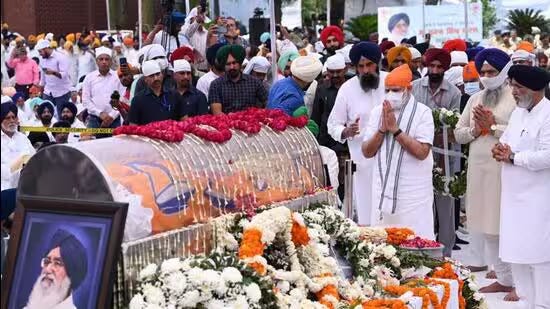
Other thrust areas
Apart from the strategies already discussed, BJP must constantly reiterate its commitment to the health and education sectors in Punjab, with a special focus on higher education and university-level education. This goes hand in hand with an emphasis on social sector development, including increased investment in Anganwadis and improving the quality of services and citizen-centric governance.
In the current economic climate, the focus should also be on creating jobs for the youth, particularly in Punjab which has a high rate of educated unemployed. However, it's important to recognize that not everyone can or should be absorbed into government jobs. This calls for an innovative approach to job creation, including a robust support system for startups. Encouraging young Punjabi men and women, many of whom are highly educated, to venture into entrepreneurship can lead to a surge of indigenous enterprises within and outside Punjab. Not only does this present a viable career path for the youth, but these new enterprises can also generate significant employment opportunities for others. This requires creating an environment conducive to entrepreneurship, such as easy access to capital, mentoring support, and a regulatory framework that minimizes hurdles and encourages growth. The BJP, with its national experience in fostering a startup culture, can play a critical role in facilitating such an ecosystem in Punjab.
Decentralization of power is another area that must be kept at the forefront of the party's agenda. Emphasizing the importance of giving more authority to Panchayati Raj Institutions and Urban Local Bodies will not only resonate with the local electorate but also reinforce BJP's commitment to true democratic decentralization.
Infrastructure is another area where BJP can focus its energies. Improvement of physical infrastructure, particularly village link roads, can significantly impact the daily lives of the residents of Punjab, thereby garnering greater support for the party.
Duplicate Voters among Migrant Labour
The widespread perception of migrant laborers from UP and Bihar having votes in both Punjab and their home states is a concerning issue that needs urgent attention, particularly in a state like Punjab with a relatively smaller population. The Election Commission of India (ECI) has been making efforts to identify and eliminate such double voters, but it remains a challenging task.
To address this problem effectively, linking the electoral rolls with the Aadhaar card seems to be a viable solution. The Central Government must collaborate with the ECI to push for this essential reform, streamlining the voter identification process and rooting out duplicate voters. By doing so, the government can enhance the integrity of the electoral system and ensure a fair representation for the residents of Punjab.
Eliminating duplicate voters will be instrumental in upholding the democratic principles of free and fair elections. Such aberrations can have a disproportionate impact on the election outcomes in Punjab, affecting the credibility of the electoral process and the representation of the state's residents.
The Central Government's support in pushing for this reform will play a crucial role in strengthening the electoral system and bolstering citizens' confidence in the democratic process. By ensuring that only eligible and legitimate voters are included in the electoral rolls, the government can safeguard the democratic rights and aspirations of the people of Punjab, leading to a more transparent and accountable governance in the state.
Traditional and long-standing demands of Punjab
Addressing both the River Waters dispute and the question of transferring Chandigarh and Punjabi-speaking areas to Punjab are significant concerns for the state's political landscape. While the transfer of territory issue requires patient negotiations and a long-term perspective, the River Waters dispute continues to be an emotive and pressing matter. The Central Government must actively consider Punjab's demand for a new River Waters Tribunal to ensure a fair division of river waters between riparian states, especially in the context of reduced water availability due to shrinking glaciers. By addressing these issues with sensitivity and strategic planning, the BJP-lead Central Government can foster regional harmony and sustainable development in Punjab2.
Punjab in equal partnership with the Centre
Above all, the narrative around the development of Punjab should not portray the state as a vassal of Delhi. Instead, the "Punjab Model" should reflect a vision of Punjab as a progressive province in an equal partnership with the Union. By fostering this vision, BJP can work towards a more inclusive and equitable development narrative that aligns with the aspirations of the people of Punjab.
Patience and Persistence
The Bharatiya Janata Party's path in Punjab should be one of patience, persistence, and long-term strategic planning. It must be understood that change, especially political change, is often a gradual process. It requires consistent efforts, constant dialogue, and the ability to adapt to evolving circumstances. We believe that the BJP, with its strong organizational framework and national presence, is well-positioned to embody these principles and strengthen its presence in Punjab.
Induct new leaders
A crucial component of this strategic vision is the infusion of new and vibrant leadership. Inclusion of energetic, dynamic individuals who have a deep understanding of the state’s unique dynamics can infuse a new momentum into the party's ranks. Their fresh perspectives and innovative ideas can be invaluable in crafting strategies that resonate with the youth, a demographic that cannot be overlooked in contemporary politics.
In this context, former bureaucrats, especially from the Sikh community, can offer substantial expertise and insights. With their extensive administrative experience and understanding of the policy landscape, they can contribute significantly to shaping the party's policies and strategies in Punjab. They can also help bridge the gap between the party and the Sikh community, fostering a more inclusive and understanding political discourse.
Moreover, leaders who are not deeply stamped with the seal of other political parties can offer a fresh, unbiased perspective and help the BJP craft its unique identity in Punjab, independent of past allegiances. These leaders, combined with the committed party workers at the grassroots level, can help the BJP in Punjab evolve into a formidable force.
Summing up
In conclusion, the BJP's strategy in Punjab should be anchored in a patient, long-term vision, supported by dynamic leadership and a deep commitment to inclusive politics. Key to this approach is proactive engagement with Punjab's diverse communities, a vital element for the success of this strategy. Such an approach is designed not only to elevate the party's profile but also to make significant contributions to the socio-economic development of Punjab, guiding the state towards progress and prosperity. Although Punjab's contribution of 13 Lok Sabha seats may seem modest in the national electoral landscape, it is pivotal for a gradual yet impactful transformation of the BJP's image and influence. This shift, moving away from the often misunderstood emphasis on Hindi, Hindu, and Hindutva, towards a more inclusive national identity, is expected to resonate with a broad spectrum of voters, including 'moderate' Hindus. This long-term, inclusive strategy, looking beyond the immediate goals of the 2024 Lok Sabha elections, is anticipated to yield incremental benefits soon and reach its full potential over the next decade. Such a vision is in harmony with the teachings of the Sikh Gurus, aiming to foster a stronger, more united future for the BJP, Punjab, and India as a whole."
Did the Supreme Court err in the SGPC-Haryana Case?
Supreme Court’s Verdict: The verdict of 20th September, 2022 pronounced by the Supreme Court of India[1], upholding the constitutional validity of the Haryana Sikh Gurdwaras (Management) Act, 2014[2], in our opinion, is not only erroneous and unconstitutionally incorrect but also significantly undermines the unpa…
SYL Canal and River Waters Dispute— How to Resolve it with one stroke of pen
A New Approach to Resolving the SYL Canal Conundrum The SYL Canal Project appears to be an insoluble and unyielding challenge. Adjudications by the Supreme Court—whether acting in its original jurisdiction on interstate disputes or its consultative jurisdiction under Article 143 of the Constitution—have failed to pro…

